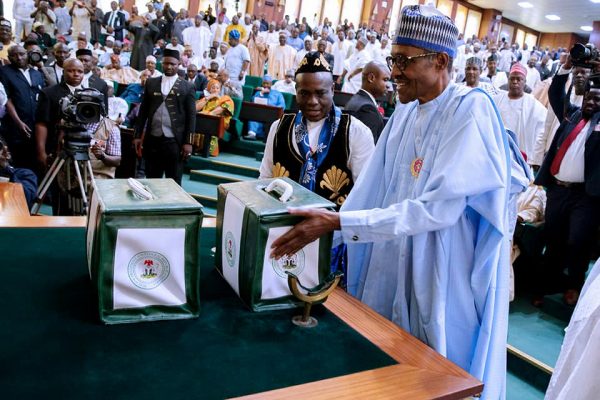BudgIT, a Civil Society Organisation, on Thursday disapproved the recently passed 2018 budget for being overly optimistic especially the 2.3 million barrels per day (bpd) oil production benchmark and other revenue indicators.
The Head of Research at BudgiT, Mr Atiku Samuel told the News Agency of Nigeria on Thursday that the Federal Government was likely to fall short in 2018 performance for over estimating its revenue.
“Even in the former proposal, as submitted by President Buhari, we felt that the budget was overly optimistic and ambitious.
“This is because in recent years, Federal Government’s revenue have not gone above N3.5 trillion.
“So quoting a revenue of N6 trillion in the 2018 budget is overly ambitious and we feel that it won’t happen, thus financing a N9.12 trillion budget on the back of such revenue is unrealistic.
“Indeed crude oil prices is going up to almost 80 dollars per barrel, and so if the crude oil price is raised to N51 dollars per barrel, it seems okay, but our biggest issue is the oil production numbers.
“Can we produce 2.3 million barrels per day? And the answer is no. We are currently producing about 1.8 million to two million bpd and I don’t see us going above that.
“Even the 2.2 million bpd quoted in the 2017 budget was never met so I don’t see us doing 2.3 million bpd now,” he said.
Samuel said also, that with the overhyped nature of the 2018 revenue projections, the capital expenditure component would suffer the most.
“Also, the rainy season is already here, therefore little construction will take place until the end of the year, so this will also affect the capital expenditure framework,” he said.
“Also, we wish to state that the country is spending too much on debt servicing. Even the entire oil revenue of Nigeria cannot service the country’s debt.
“That shows that the government needs to ensure that other variables within the economy begins to pay their fair share of tax,” he said.
He also urged the Federal Government to address its revenue loopholes by effectively monitoring its revenue agencies.
He said that the federal government could generate about N70 trillion through operating surplus from its agencies, yet was receiving so little because its agencies were infamous for under remittance.
He called for an holistic financial, compliance and performance audit of agencies such as JAMB, NAFDAC and NNPC among others.
The National Assembly on Wednesday passed the 2018 Appropriation Bill of N9.12 trillion.
After consultation with the executives, the budget was increased by the legislature by N508 billion, from the N8.61 trillion proposed by President Muhammadu Buhari in November, 2017.
The budget expenditure was premised on oil price benchmark of 51 dollars per barrel as against 45 dollars proposed by the president.
Crude oil production was benchmarked at 2.3 million barrels per day and exchange rate of N305 to one dollar.
Of the aggregate expenditure of N9.12 trillion, N530 billion was earmarked for Statutory Transfers while N2 trillion was earmarked for Debt Service.
N3.5 trillion was earmarked for Recurrent Expenditure, N2.8 trillion for Capital Expenditure, while Deficit to Gross Domestic Product was put at -1.73 per cent.
The increase in oil benchmark increased allocations to the following critical sectors of the economy; security N46.72 billion; health N57.15 billion; power, works and housing N106.50 billion.
Budget deficit was also reduced by N50.88 billion. (NAN)

